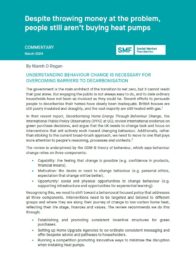The UK’s commitment to reaching net zero by 2050 is legally binding, yet progress towards decarbonisation of home heating remains limited. This SMF commentary reviews a timely recent report from the International Public Policy Observatory (IPPO) at UCL, on how to induce households to change their behaviour and replace their boilers with heat pumps.
KEY POINTS
- The International Public Policy Observatory (IPPO) report, Decarbonising Home Energy Through Behaviour Change, reviews the international evidence on green purchase decisions and argues for a more comprehensive effort to encourage households to switch to heat pumps.
- The report is underpinned by the COM-B theory of behaviour, which says behaviour change relies on three components:
- Capability: the feeling that change is possible.
- Opportunity: social and physical opportunities to change behaviour.
- Motivation: the desire or need to change behaviour.
- The report therefore calls for multiple policies to be implemented to address all three components, including:
- Establishing and promoting consistent incentive structures for green purchases.
- Setting up Home Upgrade Agencies to coordinate consistent messaging and offer bespoke advice and pathways to households.
- Running a competition promoting innovative ways to minimise the disruption when installing heat pumps.
- Capitalising on the additional time available before the phase-out of fossil fuels in home heating in the UK by further prioritising insulation and an attendant programme of activity across society.
- Considering social contexts is important when making international comparisons – transferring policy interventions across countries may be ineffective as motivations for installing heat pumps differ.
- Incentive structures need to be tailored to different household contexts to ensure those on middle incomes are not left out of funding opportunities.
- The government should use the delay to the gas boiler ban to 2035 to promote insulation, which could build consumers’ trust in the installation industry.
- Given cost constraints, low- and no-cost interventions that focus on building awareness of and confidence in heat pumps are most likely to get a hearing.

DOWNLOAD THE COMMENTARY: PDF
Kindly sponsored by

